- Home
- Lissa Evans
V for Victory Page 17
V for Victory Read online
Page 17
‘Sorry,’ she said.
‘That was a three-guinea job, you clumsy cow.’ He was shaped like a petrol pump, with a small round head on wide shoulders, and his hair was slicked to the scalp as if painted on.
‘I said I was sorry.’
The crowd swayed forward again, carrying Vee beyond him, and closer to Mario, who was talking over the barriers to a porter. He looked round and caught her eye.
‘Guy says there’s a rocket on a place called Battersby.’
‘Battersea, I expect. That’s where all the lines from Victoria run.’
‘PUSH ALL YOU LIKE,’ said the announcer. ‘HITLER’S CANCELLED THE TRAINS UNTIL FURTHER NOTICE, SO ALL COMPLAINTS SHOULD BE ADDRESSED TO BERLIN.’
There was a groan of protest, and then a lessening of crowd pressure as people began to move away.
‘But how are we going to get back?’ asked Vee.
‘Itch,’ said the Tommy, who’d appeared beside her once again.
‘Itch?’
He stuck out a thumb in illustration. ‘Mind you, they don’t like stopping in the rain. You might have to show them a bit of knee, know what I mean? Want to travel with me?’
‘No.’
He winked. ‘You’re probably right. You’ll get further on your own.’
‘Stop it,’ she said. ‘Stop talking to me like that,’ and she was astonished to hear a firmness in her voice, a sharp finality that made him draw back, as if slapped; before she’d become respectable Mrs Overs she’d had years and years of men like Tommy Tooth-Stubs treating her like a tart because she didn’t have any money or a visible husband, or maybe it was because of the way she looked or how she talked (she’d never known the exact reason – it was as if someone had daubed something indelible on her back), but she remembered how it had sometimes seemed less of an effort to simply go along with their assumptions rather than yet again having to hear the climbing complaint of her own voice. And yet here she was now, sounding like Edith Evans.
‘Keep your corsets on,’ muttered the Tommy, but he looked as if he’d just bitten into a crab sandwich and cracked his tooth on a piece of shell.
Vee turned away, searching for Mario, and found herself instead staring at an object held in front of her. It had once been pearl-grey felt with a maroon silk ribbon, and now looked like something fished out of a blocked drain.
‘Three guineas,’ said the man with the round head. ‘You owe me.’
‘It was an accident.’
‘Three guineas,’ he repeated, pushing his face towards hers, and she took a step back and stumbled over someone’s foot, turning her ankle and falling sideways, her out-flung hand desperately grabbing on to something that turned out to be Hat Man’s tie.
‘What the HELL!’ It was Mario’s voice, roaring across the crowd. ‘Did you just hit that lady?’
The answer was strangulated.
‘Did you just HIT her?’
‘No, he didn’t, I tripped, I’m all right!’ shouted Vee, from below, her voice lost among the damp overcoats. She’d landed on one knee, her shoe half off, and she was still crouched, struggling to replace it when the fight started, all pushes and grunts and lurches, the odd smack of flesh on flesh. It was a station porter who pulled her out of the crowd, and she straightened to see a heaving knot of men, khaki serge, grey flannel, red faces, a split shoulder-seam showing a crescent of pale blue shirt, Mario’s head pushed back at an angle by someone’s hand under his chin, and then a whistle blew and two coppers elbowed past, followed by a third. The knot unravelled, an airman dodged towards the exit, his nose streaming blood, and then the struggle was over and Mario and Hat Man and an indignant-looking American sailor were being arrested, and everyone was talking at once, even Vee, though the phrase ‘It’s all been a mistake, Officer’ felt chillingly familiar in her mouth, and God knows it had never done her an ounce of good in the past. In any case, she thought, if anyone could talk his way out of custody, it would be Mario, who, by the time they had reached the police station two hundred yards away, had already recounted the story of a friend of his who had stumbled during a St Patrick’s Day Parade and accidentally punched a police horse. He looked round for Vee as they filed up the steps and under the blue lamp. ‘You gonna wait? You don’t have to.’
‘Of course I’ll wait,’ she said. No one in her life before had ever swung a fist on her behalf. Besides, she had no idea how to get home on her own.
Noel stayed up until midnight. After finishing an essay entitled ‘The Structure and Properties of the Metallic Elements’ for Dr Parry-Jones, he laid the table for breakfast and then took The Complete Saki up to bed with him. The house was quiet, except for the usual creaks and ticks, and the cycle of Mr Reddish’s snore in the next room, starting each time with a gentle snuffle and building gradually to something that sounded like a death-clash between rival wild boars, before subsiding, for a golden minute or two, into silence. ‘I expect there’s been a problem with the trains,’ Mr Jepson had said, when Vee hadn’t returned by supper time. Mr Reddish had suggested the same thing, while Miss Appleby, arriving home late herself, had exclaimed, ‘Ooh, isn’t she back yet? The naughty girl!’, which hadn’t been helpful.
His favourite Saki story, ‘The Lumber Room’, failed to deliver its usual dose of vicious charm, and Noel got out of bed again, turned off the reading lamp and opened the shutters; it was a clear night, the Vale of Health magnesium-grey under a three-quarter moon, the puddles in the empty lane like drops of mercury. He stood for a while, growing steadily colder, and then fetched the eiderdown from the bed and sat swaddled on the window seat, staring downward. He’d spent much of the day in a similar pose in his eyrie above the Cast Court, a chemistry textbook open on the parapet in front of him for those times when the gallery was empty. It had been the fourth day of his vigil, and once again, his father had failed to appear; the hours had passed extraordinarily slowly. He’d seen a group of Sikh soldiers taking snapshots in front of the Moghul Gate, and a sailor tapping cigarette ash into a marble satyr’s mouth. Mid-afternoon, a couple had entered the small room at the base of the Trajan Column, and had remained in there for far longer than a general interest in the structure of the hollow interior would warrant, and just after that, a V-2 had dropped somewhere to the south of the museum, and the glass in one of the high windows had rattled in sympathy, like a distant road drill. ‘Came down near Clapham Junction’ was the verdict of someone Noel had overheard on the Tube home.
Walking back from the station to Green Shutters, he had come to the conclusion that he really should tell Vee about the Christmas Day meeting – partly because he ought to, partly because the encounter was beginning to assume an almost hallucinatory quality in his memory, and if he actually spoke Simeon’s name, and had to respond to the fire-hose of questions, exclamations and horrified squawks which would undoubtedly follow, then the whole thing might become more concrete again, but also because he missed talking to her, missed the syncopated rhythm of their conversation, their own peculiar patois, evolved to span the gap between them, like the Canary Islanders Noel had once read about, communicating across unbridgeable ravines with a language of whistles. Of course, they hadn’t actually had a proper sit-down talk for weeks, not since the arrival of the Great Yankino, King of Garrulity, with his giant head, and hay-load of hilarious anecdotes. No doubt he’d organized an enormous game of Hunt the Thimble on Brighton seafront, and Vee was still searching the underside of the pier.
Noel kept his eyes on the muddy lane and mentally listed all the most mundane reasons possible for the delay, and then thought, for the twentieth time, about the V-2 that he’d heard, and wondered why she hadn’t tried to telephone, and was impelled to put on his slippers and go back downstairs to check if the line was working. He lifted the receiver, hoping for the silence that would explain Vee’s failure to ring, and heard instead the usual echoing crackles, and that was when he began to feel afraid, the feeling knifing out from the past, from a night half his lifetime
ago, when Mattie had lost herself entirely and had unbolted the door and wandered into the darkness. The events that had followed – Noel’s removal to his aunt and uncle in Kentish Town, Mattie’s death in hospital, the new school, the evacuation to St Albans – had been compressed in his mind to a single blurred journey, like a train carriage diving into a tunnel, the view extinguished, the voices of strangers inaudible beneath the roar of the engine, the faces in the half-light as featureless as plates. And then, with sudden and perfect clarity, the recollection of seeing Vee, red-faced, running to catch a bus with an empty collection box in her hand while a man shouted threats at her from an open front door. That was when his second life had begun, flimsy and makeshift initially, before a slow tide had caught and turned it, pulled it gradually towards the solid anchor of the first, and the two had abutted, so that now Green Shutters was as much one as the other, and a clatter in the hall might be Mattie trying to juggle conkers or Vee dropping a box of cotton reels, and to find the door unbolted again, to find himself for the second time searching hopelessly in the dark, was hideous.
He replaced the receiver and knew that he wouldn’t sleep. A narrow strip of moonlight lay across the floor, bisecting the chessboard. Pushing the shutter closed, he turned on the light and set out the pieces – the pawns with their polished heads, the black king who bore the tooth-marks of a visiting dog, the rooks (or castles), into whose crenellated tops one could wedge a little finger, and wear like a Balinese dancer’s nails. He started by playing Mario and beat him by a fool’s mate in three, and then set himself up against Genevieve Lumb, and let her win. Mattie was always a more difficult proposition; she began with pawn to e4, an obvious Sicilian defence, but she’d caught him out before now. He turned the board again and studied it, elbows on knees, hands clasped to stop them trembling.
He was frying bacon when Vee walked into the kitchen, her footsteps inaudible under the sizzle. ‘I’m back!’ she said. ‘You won’t believe what happened!’ and Noel turned, relief flapping across his face, to be replaced almost instantly with something darker, and Vee knew straight away that she’d been wrong to predict that he’d be merely cross and worried, because it was far worse than that.
‘Why didn’t you telephone?’
‘Well, that’s the thing, I never had a chance, because – well, it’s quite a complicated story, but it all started with somebody’s hat …’ She was half laughing, just from nerves; Noel’s expression was that of a hanging judge. ‘… You see, we’d just got back to Brighton Station when they made an announcement—’
But Noel, hearing only the laugh, had already jerked the pan from the stove.
‘I have to go,’ he said, not looking at Vee. From the corner of his eye he could see that Mr Jepson had entered the kitchen.
‘Go where?’ asked Vee.
‘It’s not actually any of your business,’ said Noel, walking past Mr Jepson and into the hall, taking his duffel coat from the hook, and opening the front door, something that took a couple of tries, since it was rarely used and the wood always swelled in the winter. Outside, it was bright and sharp, the sky wiped clean by the rain, a female blackbird poking around on the front lawn.
‘Noel!’ called Vee, from the hall, but he marched straight along the front path, startling the blackbird, unlatching the gate with such force that he skinned a knuckle, and slamming it with ferocity behind him. Funny; she’d thought it was funny. Last night, he’d played three more games of chess and then had rearranged all the books on the drawing-room shelves in alphabetical order, before getting dressed and walking along the lane in the moonlight, owls twitting, another V-2 exploding somewhere out west, ignorant armies clashing by night all over Europe and North Africa, everything split, fractured, missing, irreparable, and then he’d turned back to see dawn breaking over Highgate in the usual way, a streak of khaki-yellow like a wiped nose, and had gone home to begin on the lodgers’ breakfast, and while he’d been spooning the tea into the pot it had occurred to him that if Vee were dead – and he knew she might be dead, he couldn’t pretend it wasn’t possible, unspeakable things happened all the time – she would probably want a Methodist funeral, a ceremony about which he knew nothing whatsoever; a knitted coffin cover, probably, and a tombola to choose the hymn numbers, and a plot with a wooden marker at the new end of Highgate Cemetery, the bit that looked like a corner of a school playing-field. And then, just as he was placing a jar of her favourite Virginia stocks on the newly filled grave, in she’d waltzed, laughing, and his stomach, which had felt like a knotted balloon since the previous afternoon, had untwisted itself and he’d tasted acid. He could still taste it an hour later, arriving at the Victoria and Albert Museum ten minutes before opening time. There was already a queue: three matelots, a very old lady carrying a string bag filled with stained newspapers, and a naval officer. Simeon.
‘You’ve hurt your foot,’ said Mr Jepson, from the hall. Vee closed the front door and looked down at herself. Her left ankle sagged like bread dough over the top of her shoe, the stocking laddered in three places.
‘I turned it,’ she said. ‘I’ll give it a soak in a minute – you don’t happen to know where Noel’s off to?’
‘I don’t, I’m afraid. Would you like me to try and catch up with him?’
She hesitated and then shook her head. ‘No, thanks – probably better to leave him. He’ll come round.’
‘Morning, Mrs Overs,’ said Miss Appleby, clattering down the stairs, and then coming face to face with Vee and performing a double-take of music-hall proportions. ‘Ooh, can see you had a good time,’ she said, giving a distinctly sisterly wink before carrying on towards the kitchen, and Vee, rather stunned, turned and saw herself in the hall mirror, eyes like boiled onions, hat askew, her hair down at the back, no lipstick, a streak of powder on her neck, the skin of which was already blotchy with an incipient blush. ‘There was a V-2 on the railway lines,’ she said, rubbing at her throat. ‘I’ve been travelling all night, trying to get home, I knew he’d be worried.’
‘I thought it would probably be something like that,’ said Mr Jepson. ‘I said as much to Noel. As did Mr Reddish.’
‘I don’t know what Miss Appleby was implying,’ said Vee, though obviously she did; it had been about as subtle as a dropped fire-iron. ‘I’m not that type of woman.’
‘Of course not,’ said Mr Jepson. ‘And the corporal’s—’ He checked himself, his mouth staying open but no sound issuing from it, so he looked like a stuck film.
‘What?’ asked Vee.
Jepson unstuck himself. ‘Just that … well, I’m sure you know.’
‘Know what?’
It took a couple of attempts for him to answer, his voice creaking as it emerged. ‘That Corporal O’Mahoney’s not that type of man.’
For a moment she didn’t understand, too tired to connect two thoughts that didn’t seem to fit together.
‘I think there’s tea,’ said Jepson, rather hurriedly. ‘Would you like a cup?’
‘You’re not saying he’s a – a pansy? But he’s not like …’ Her mind jumped back to poor Ronald Cuffley in the village where she’d grown up, who’d never been like the other boys, a lamb among bullocks, and who after Eddie Clare had accused him of trying to touch him where he shouldn’t, had been pushed over and rolled in cow-pats, tripped, punched, smacked, taunted, week after week, year after year, until one day he’d drunk Brasso and his mother had stood in the road outside the church on Sunday and shouted at everyone that they were no better than the beasts of the field. ‘The corporal’s not like that,’ she said.
Jepson was silent. Vee removed her hat and looked back at the mirror, smoothing her hair.
‘Yesterday he got into a fight because of me,’ she said. ‘He thought someone had knocked me down, and he ended up being arrested. Does that sound like a pansy?’
Jepson looked down at the space where the hall carpet used to be. ‘The only man in my battalion to win an MC was an invert,’ he said, quietly. ‘B
ut I really shouldn’t have said anything.’
‘No,’ said Vee. She remembered her silly little daydream of a farewell kiss and a promise: Hey, honey, don’t forget me, I’ll be back … She hadn’t even seen him to say goodbye. After she’d been waiting for over an hour in the police station – standing up the whole time because the only bench in the place was not only sticky but occupied by a man who was spitting bits of tooth into a handkerchief – two US military policemen had walked in, both wearing those huge white hats which had earned them the nickname ‘Snowdrops’, but which reminded her far more of the toadstools in Fantasia. They’d been ushered into the back somewhere, another hour had inched by, and then the police officer at the desk had beckoned Vee over and asked if she was waiting for the GIs, and if so, they’d gone out the other entrance with the toadstools and were being taken back to their camp. ‘They look after their own, that lot,’ he’d said, before turning his attention to a lost-dog report.
She’d intended to ring home, but someone had pulled the receiver off the only telephone-box she could find, so instead she’d found her way back to Brighton Station, where the odd train was running again, and had taken the first that was going in the general direction of London, and which, after stopping every twenty-five yards, had deposited her in a bomb-site called East Croydon at half-past two in the morning. Eventually, there’d been a bus, the first of four, or five – she’d lost count. She’d slept maybe ten minutes the whole night. Her head felt stuffed with sand.
Mr Jepson was still standing there, looking apologetic. Vee turned away and began to unbutton her coat with hands that were clumsy with cold, and somehow managed to drop her handbag. There was the bright, precise noise of breaking china. She picked up the bag and looked inside at the pieces of the knife handle, the razor fragments of the narrow, subtly coloured shell she’d brought back for Noel. ‘Well, that’s that,’ she said, and went upstairs.
His father looked thinner, and there were yellow crusts on the lashes of his right eye. ‘Are you still ill?’ asked Noel, once they were inside the museum. ‘I was beginning to think that you must have embarked.’

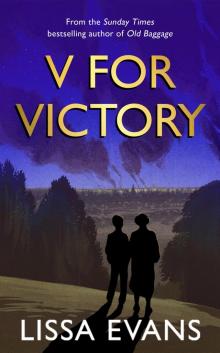 V for Victory
V for Victory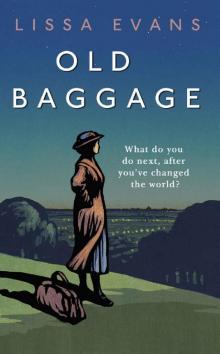 Old Baggage
Old Baggage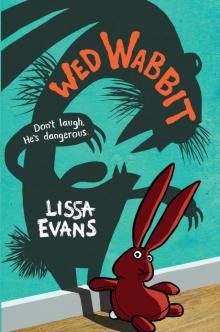 Wed Wabbit
Wed Wabbit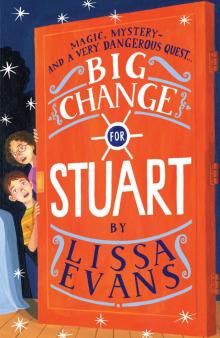 Big Change for Stuart
Big Change for Stuart Spencer's List
Spencer's List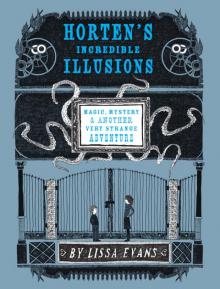 Horten's Incredible Illusions
Horten's Incredible Illusions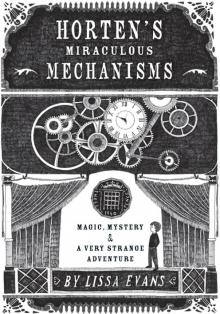 Horten's Miraculous Mechanisms
Horten's Miraculous Mechanisms Their Finest Hour and a Half
Their Finest Hour and a Half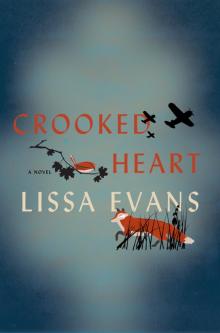 Crooked Heart
Crooked Heart